Effective Communication, Patient-Centered Care, and Outcomes
VerifiedAdded on 2023/01/23
|7
|1622
|30
Essay
AI Summary
This essay delves into the crucial role of effective communication, patient-centered care, and documentation in nursing practice. It emphasizes the importance of therapeutic communication, highlighting both verbal and nonverbal skills, and its impact on building rapport, trust, and patient adherence to treatment. The essay also explores the principles of patient-centered care, advocating for patient autonomy and shared decision-making to empower patients in managing their health. Furthermore, it underscores the significance of accurate and systematic documentation for efficient communication among healthcare professionals, legal compliance, and the creation of patient registries. The analysis utilizes a case study of Chester to demonstrate the application of these concepts in achieving positive health outcomes and enhancing patient satisfaction. The essay concludes by reinforcing the necessity of these three elements in fostering a supportive and effective healthcare environment.
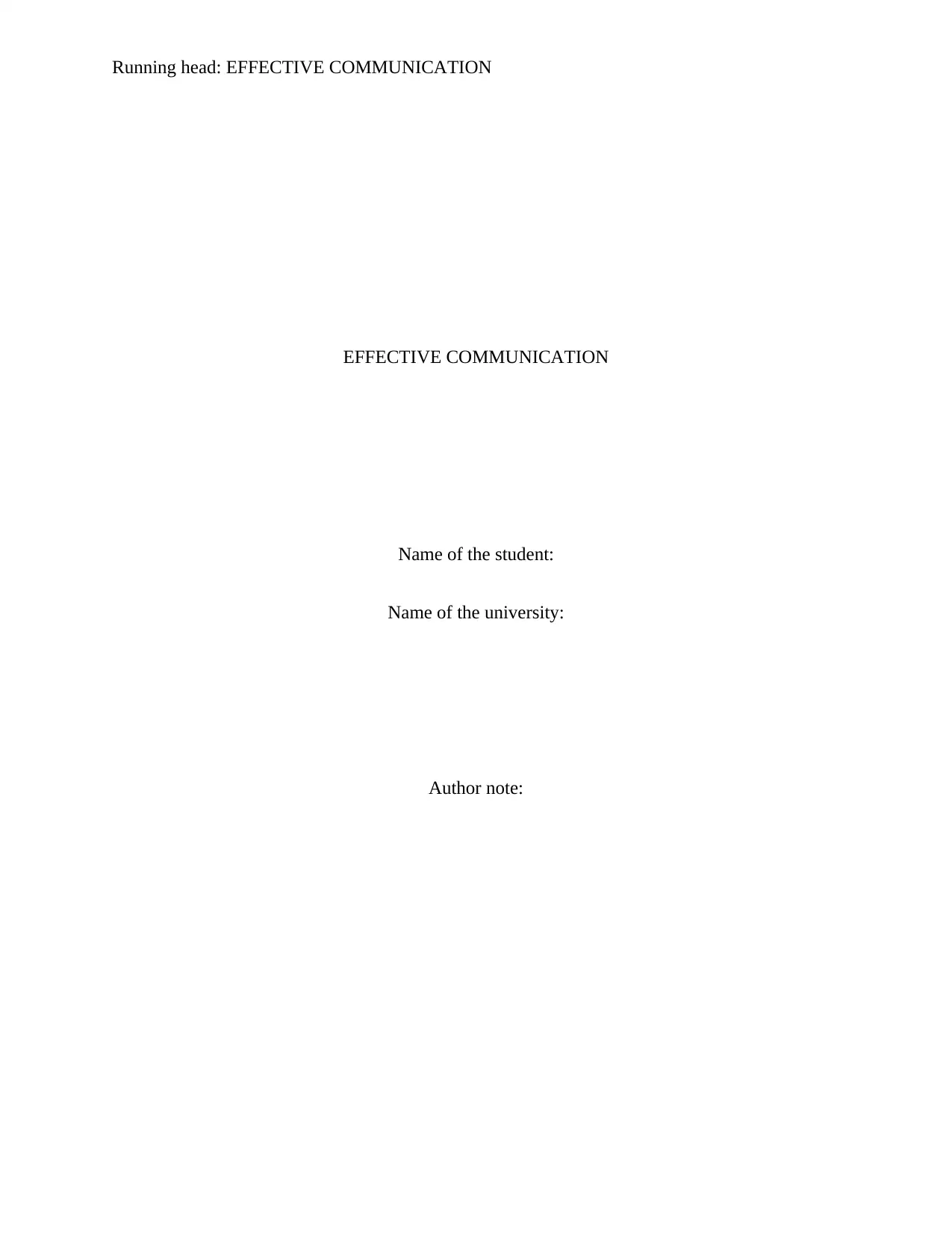
Running head: EFFECTIVE COMMUNICATION
EFFECTIVE COMMUNICATION
Name of the student:
Name of the university:
Author note:
EFFECTIVE COMMUNICATION
Name of the student:
Name of the university:
Author note:
Paraphrase This Document
Need a fresh take? Get an instant paraphrase of this document with our AI Paraphraser
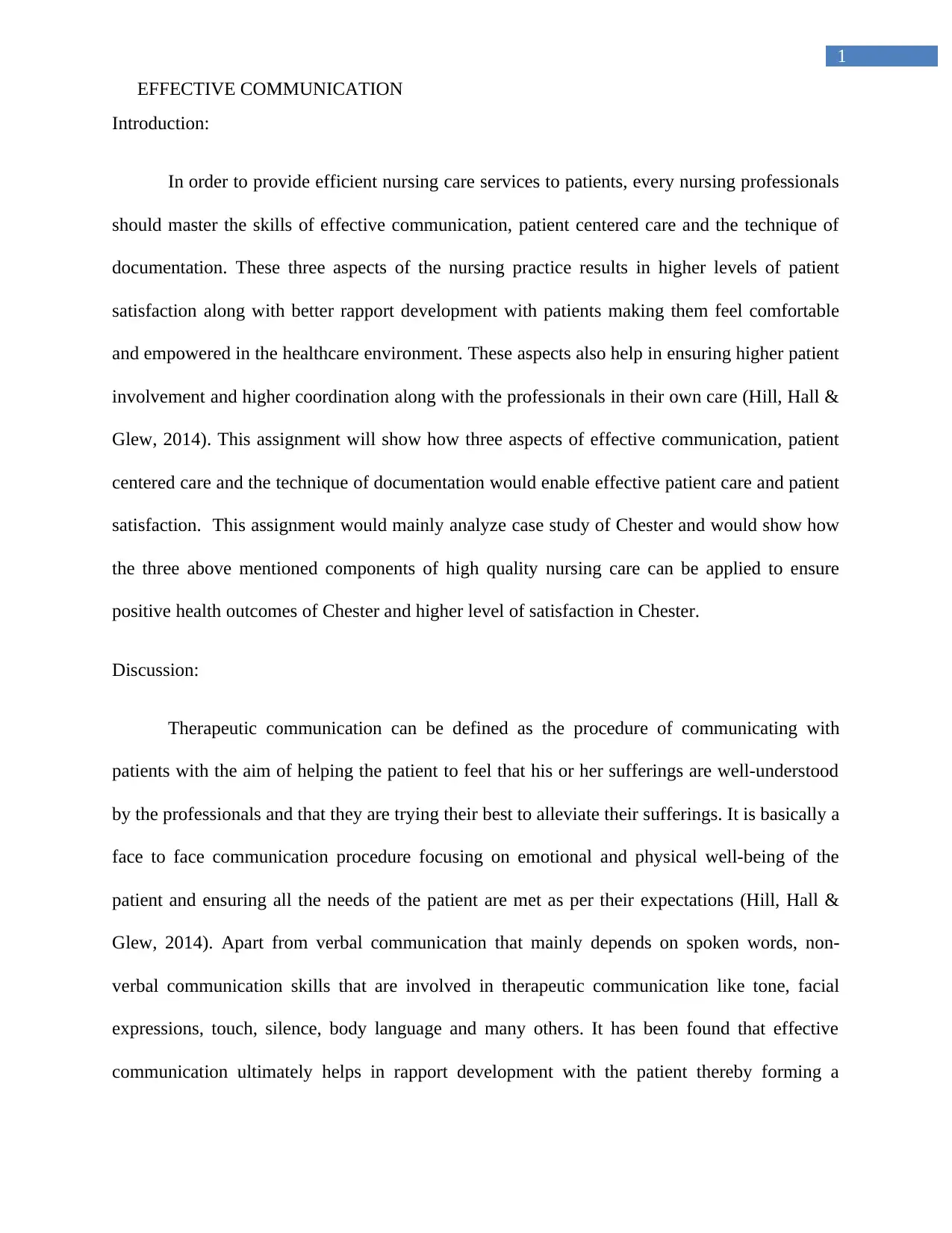
1
EFFECTIVE COMMUNICATION
Introduction:
In order to provide efficient nursing care services to patients, every nursing professionals
should master the skills of effective communication, patient centered care and the technique of
documentation. These three aspects of the nursing practice results in higher levels of patient
satisfaction along with better rapport development with patients making them feel comfortable
and empowered in the healthcare environment. These aspects also help in ensuring higher patient
involvement and higher coordination along with the professionals in their own care (Hill, Hall &
Glew, 2014). This assignment will show how three aspects of effective communication, patient
centered care and the technique of documentation would enable effective patient care and patient
satisfaction. This assignment would mainly analyze case study of Chester and would show how
the three above mentioned components of high quality nursing care can be applied to ensure
positive health outcomes of Chester and higher level of satisfaction in Chester.
Discussion:
Therapeutic communication can be defined as the procedure of communicating with
patients with the aim of helping the patient to feel that his or her sufferings are well-understood
by the professionals and that they are trying their best to alleviate their sufferings. It is basically a
face to face communication procedure focusing on emotional and physical well-being of the
patient and ensuring all the needs of the patient are met as per their expectations (Hill, Hall &
Glew, 2014). Apart from verbal communication that mainly depends on spoken words, non-
verbal communication skills that are involved in therapeutic communication like tone, facial
expressions, touch, silence, body language and many others. It has been found that effective
communication ultimately helps in rapport development with the patient thereby forming a
EFFECTIVE COMMUNICATION
Introduction:
In order to provide efficient nursing care services to patients, every nursing professionals
should master the skills of effective communication, patient centered care and the technique of
documentation. These three aspects of the nursing practice results in higher levels of patient
satisfaction along with better rapport development with patients making them feel comfortable
and empowered in the healthcare environment. These aspects also help in ensuring higher patient
involvement and higher coordination along with the professionals in their own care (Hill, Hall &
Glew, 2014). This assignment will show how three aspects of effective communication, patient
centered care and the technique of documentation would enable effective patient care and patient
satisfaction. This assignment would mainly analyze case study of Chester and would show how
the three above mentioned components of high quality nursing care can be applied to ensure
positive health outcomes of Chester and higher level of satisfaction in Chester.
Discussion:
Therapeutic communication can be defined as the procedure of communicating with
patients with the aim of helping the patient to feel that his or her sufferings are well-understood
by the professionals and that they are trying their best to alleviate their sufferings. It is basically a
face to face communication procedure focusing on emotional and physical well-being of the
patient and ensuring all the needs of the patient are met as per their expectations (Hill, Hall &
Glew, 2014). Apart from verbal communication that mainly depends on spoken words, non-
verbal communication skills that are involved in therapeutic communication like tone, facial
expressions, touch, silence, body language and many others. It has been found that effective
communication ultimately helps in rapport development with the patient thereby forming a
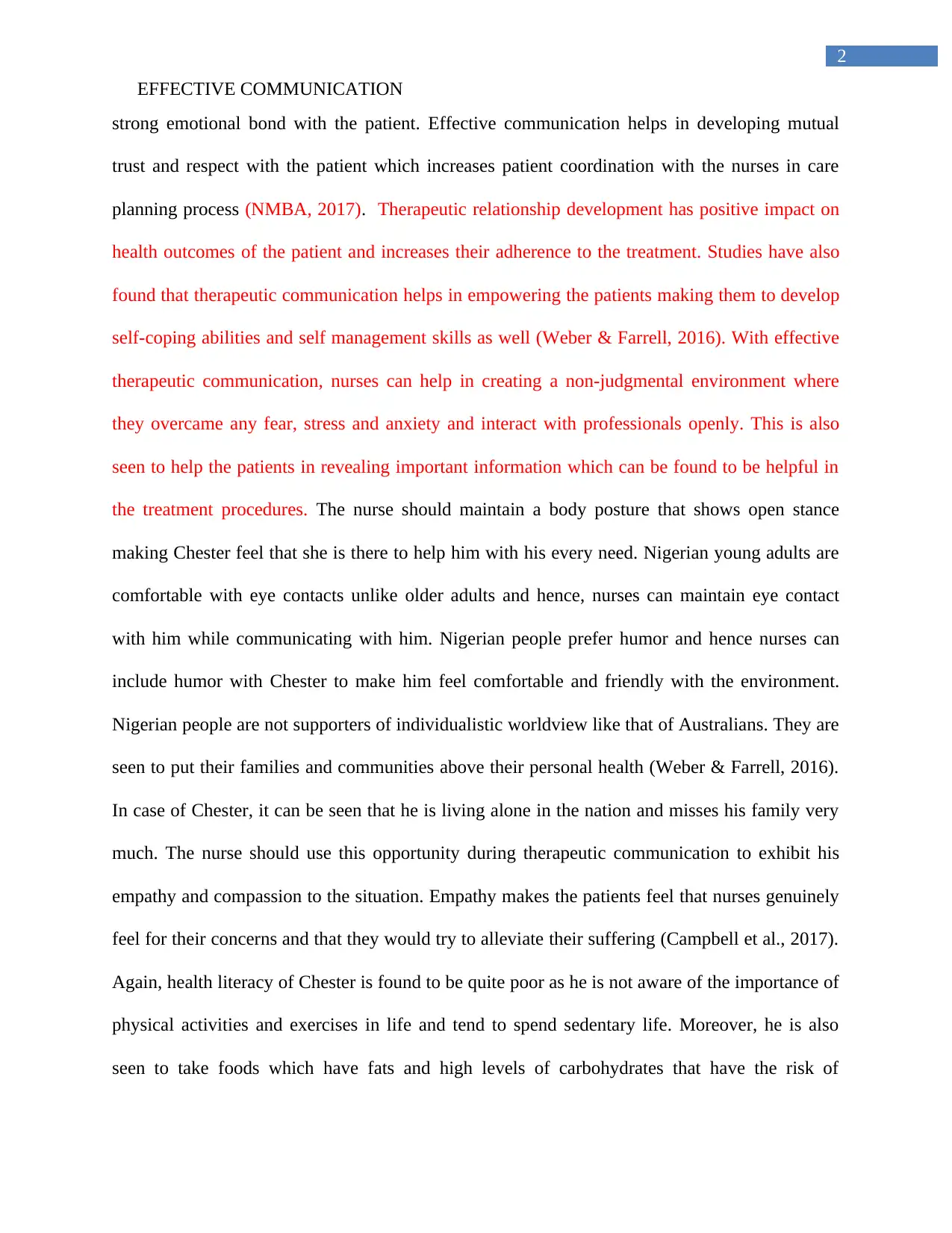
2
EFFECTIVE COMMUNICATION
strong emotional bond with the patient. Effective communication helps in developing mutual
trust and respect with the patient which increases patient coordination with the nurses in care
planning process (NMBA, 2017). Therapeutic relationship development has positive impact on
health outcomes of the patient and increases their adherence to the treatment. Studies have also
found that therapeutic communication helps in empowering the patients making them to develop
self-coping abilities and self management skills as well (Weber & Farrell, 2016). With effective
therapeutic communication, nurses can help in creating a non-judgmental environment where
they overcame any fear, stress and anxiety and interact with professionals openly. This is also
seen to help the patients in revealing important information which can be found to be helpful in
the treatment procedures. The nurse should maintain a body posture that shows open stance
making Chester feel that she is there to help him with his every need. Nigerian young adults are
comfortable with eye contacts unlike older adults and hence, nurses can maintain eye contact
with him while communicating with him. Nigerian people prefer humor and hence nurses can
include humor with Chester to make him feel comfortable and friendly with the environment.
Nigerian people are not supporters of individualistic worldview like that of Australians. They are
seen to put their families and communities above their personal health (Weber & Farrell, 2016).
In case of Chester, it can be seen that he is living alone in the nation and misses his family very
much. The nurse should use this opportunity during therapeutic communication to exhibit his
empathy and compassion to the situation. Empathy makes the patients feel that nurses genuinely
feel for their concerns and that they would try to alleviate their suffering (Campbell et al., 2017).
Again, health literacy of Chester is found to be quite poor as he is not aware of the importance of
physical activities and exercises in life and tend to spend sedentary life. Moreover, he is also
seen to take foods which have fats and high levels of carbohydrates that have the risk of
EFFECTIVE COMMUNICATION
strong emotional bond with the patient. Effective communication helps in developing mutual
trust and respect with the patient which increases patient coordination with the nurses in care
planning process (NMBA, 2017). Therapeutic relationship development has positive impact on
health outcomes of the patient and increases their adherence to the treatment. Studies have also
found that therapeutic communication helps in empowering the patients making them to develop
self-coping abilities and self management skills as well (Weber & Farrell, 2016). With effective
therapeutic communication, nurses can help in creating a non-judgmental environment where
they overcame any fear, stress and anxiety and interact with professionals openly. This is also
seen to help the patients in revealing important information which can be found to be helpful in
the treatment procedures. The nurse should maintain a body posture that shows open stance
making Chester feel that she is there to help him with his every need. Nigerian young adults are
comfortable with eye contacts unlike older adults and hence, nurses can maintain eye contact
with him while communicating with him. Nigerian people prefer humor and hence nurses can
include humor with Chester to make him feel comfortable and friendly with the environment.
Nigerian people are not supporters of individualistic worldview like that of Australians. They are
seen to put their families and communities above their personal health (Weber & Farrell, 2016).
In case of Chester, it can be seen that he is living alone in the nation and misses his family very
much. The nurse should use this opportunity during therapeutic communication to exhibit his
empathy and compassion to the situation. Empathy makes the patients feel that nurses genuinely
feel for their concerns and that they would try to alleviate their suffering (Campbell et al., 2017).
Again, health literacy of Chester is found to be quite poor as he is not aware of the importance of
physical activities and exercises in life and tend to spend sedentary life. Moreover, he is also
seen to take foods which have fats and high levels of carbohydrates that have the risk of
⊘ This is a preview!⊘
Do you want full access?
Subscribe today to unlock all pages.

Trusted by 1+ million students worldwide
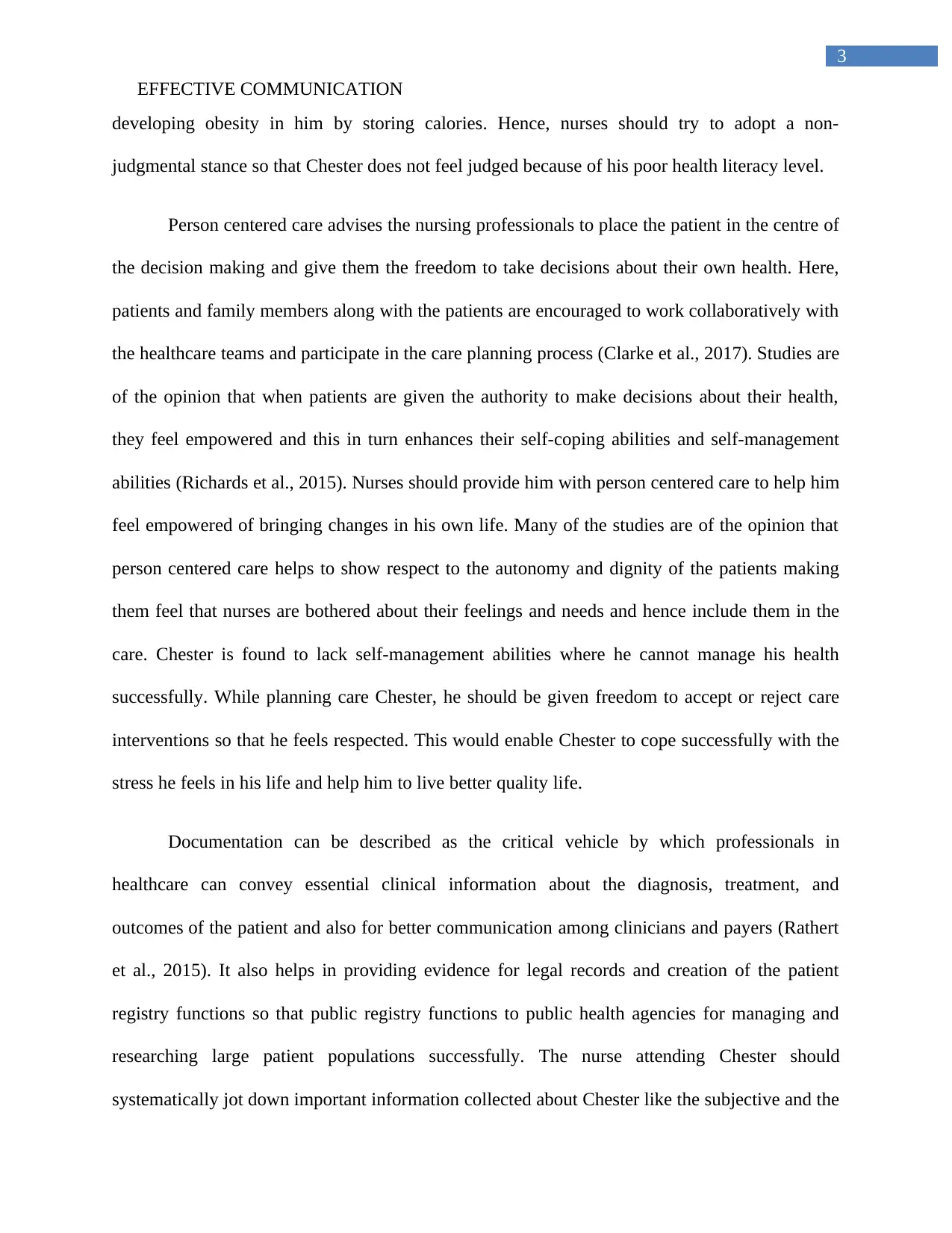
3
EFFECTIVE COMMUNICATION
developing obesity in him by storing calories. Hence, nurses should try to adopt a non-
judgmental stance so that Chester does not feel judged because of his poor health literacy level.
Person centered care advises the nursing professionals to place the patient in the centre of
the decision making and give them the freedom to take decisions about their own health. Here,
patients and family members along with the patients are encouraged to work collaboratively with
the healthcare teams and participate in the care planning process (Clarke et al., 2017). Studies are
of the opinion that when patients are given the authority to make decisions about their health,
they feel empowered and this in turn enhances their self-coping abilities and self-management
abilities (Richards et al., 2015). Nurses should provide him with person centered care to help him
feel empowered of bringing changes in his own life. Many of the studies are of the opinion that
person centered care helps to show respect to the autonomy and dignity of the patients making
them feel that nurses are bothered about their feelings and needs and hence include them in the
care. Chester is found to lack self-management abilities where he cannot manage his health
successfully. While planning care Chester, he should be given freedom to accept or reject care
interventions so that he feels respected. This would enable Chester to cope successfully with the
stress he feels in his life and help him to live better quality life.
Documentation can be described as the critical vehicle by which professionals in
healthcare can convey essential clinical information about the diagnosis, treatment, and
outcomes of the patient and also for better communication among clinicians and payers (Rathert
et al., 2015). It also helps in providing evidence for legal records and creation of the patient
registry functions so that public registry functions to public health agencies for managing and
researching large patient populations successfully. The nurse attending Chester should
systematically jot down important information collected about Chester like the subjective and the
EFFECTIVE COMMUNICATION
developing obesity in him by storing calories. Hence, nurses should try to adopt a non-
judgmental stance so that Chester does not feel judged because of his poor health literacy level.
Person centered care advises the nursing professionals to place the patient in the centre of
the decision making and give them the freedom to take decisions about their own health. Here,
patients and family members along with the patients are encouraged to work collaboratively with
the healthcare teams and participate in the care planning process (Clarke et al., 2017). Studies are
of the opinion that when patients are given the authority to make decisions about their health,
they feel empowered and this in turn enhances their self-coping abilities and self-management
abilities (Richards et al., 2015). Nurses should provide him with person centered care to help him
feel empowered of bringing changes in his own life. Many of the studies are of the opinion that
person centered care helps to show respect to the autonomy and dignity of the patients making
them feel that nurses are bothered about their feelings and needs and hence include them in the
care. Chester is found to lack self-management abilities where he cannot manage his health
successfully. While planning care Chester, he should be given freedom to accept or reject care
interventions so that he feels respected. This would enable Chester to cope successfully with the
stress he feels in his life and help him to live better quality life.
Documentation can be described as the critical vehicle by which professionals in
healthcare can convey essential clinical information about the diagnosis, treatment, and
outcomes of the patient and also for better communication among clinicians and payers (Rathert
et al., 2015). It also helps in providing evidence for legal records and creation of the patient
registry functions so that public registry functions to public health agencies for managing and
researching large patient populations successfully. The nurse attending Chester should
systematically jot down important information collected about Chester like the subjective and the
Paraphrase This Document
Need a fresh take? Get an instant paraphrase of this document with our AI Paraphraser
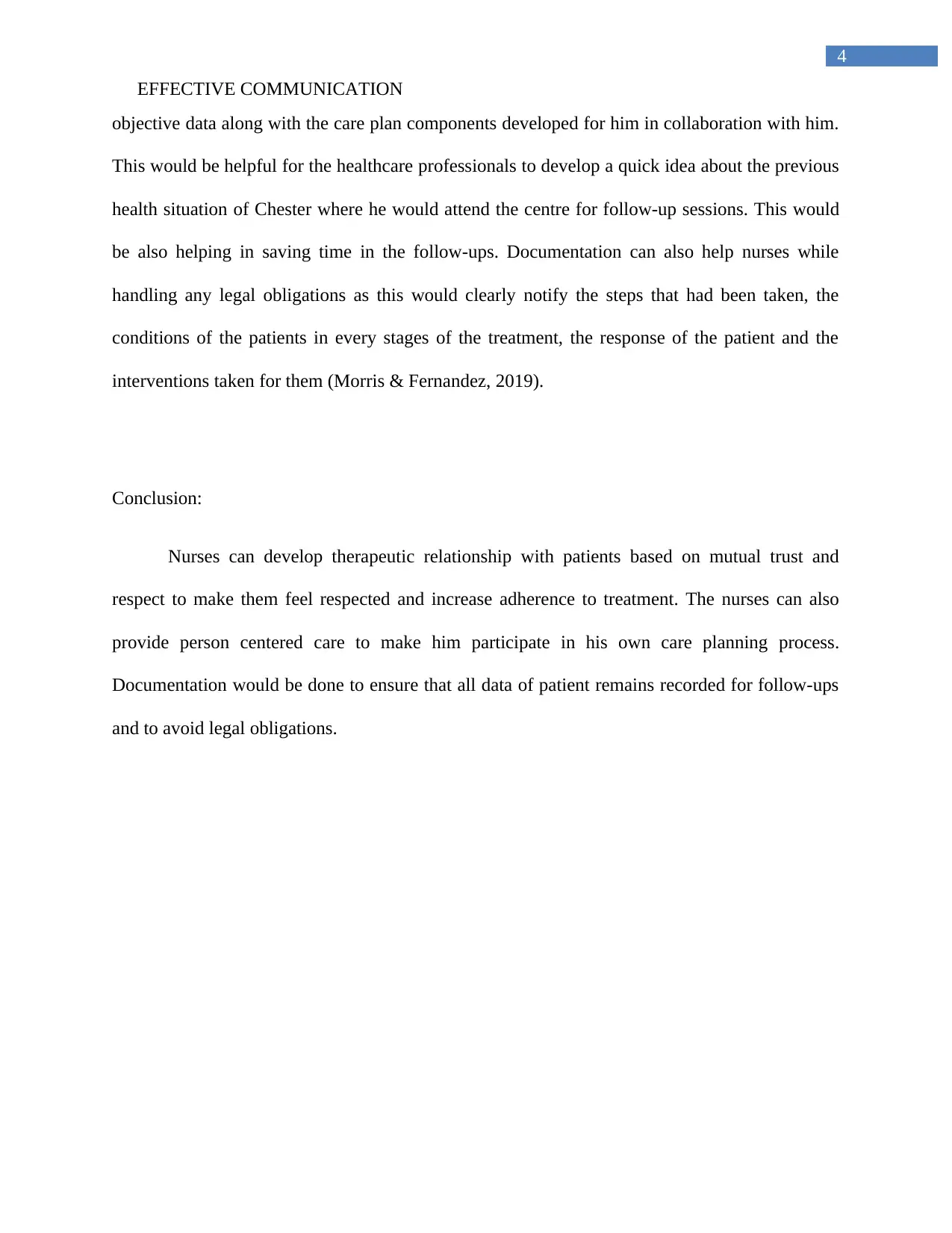
4
EFFECTIVE COMMUNICATION
objective data along with the care plan components developed for him in collaboration with him.
This would be helpful for the healthcare professionals to develop a quick idea about the previous
health situation of Chester where he would attend the centre for follow-up sessions. This would
be also helping in saving time in the follow-ups. Documentation can also help nurses while
handling any legal obligations as this would clearly notify the steps that had been taken, the
conditions of the patients in every stages of the treatment, the response of the patient and the
interventions taken for them (Morris & Fernandez, 2019).
Conclusion:
Nurses can develop therapeutic relationship with patients based on mutual trust and
respect to make them feel respected and increase adherence to treatment. The nurses can also
provide person centered care to make him participate in his own care planning process.
Documentation would be done to ensure that all data of patient remains recorded for follow-ups
and to avoid legal obligations.
EFFECTIVE COMMUNICATION
objective data along with the care plan components developed for him in collaboration with him.
This would be helpful for the healthcare professionals to develop a quick idea about the previous
health situation of Chester where he would attend the centre for follow-up sessions. This would
be also helping in saving time in the follow-ups. Documentation can also help nurses while
handling any legal obligations as this would clearly notify the steps that had been taken, the
conditions of the patients in every stages of the treatment, the response of the patient and the
interventions taken for them (Morris & Fernandez, 2019).
Conclusion:
Nurses can develop therapeutic relationship with patients based on mutual trust and
respect to make them feel respected and increase adherence to treatment. The nurses can also
provide person centered care to make him participate in his own care planning process.
Documentation would be done to ensure that all data of patient remains recorded for follow-ups
and to avoid legal obligations.
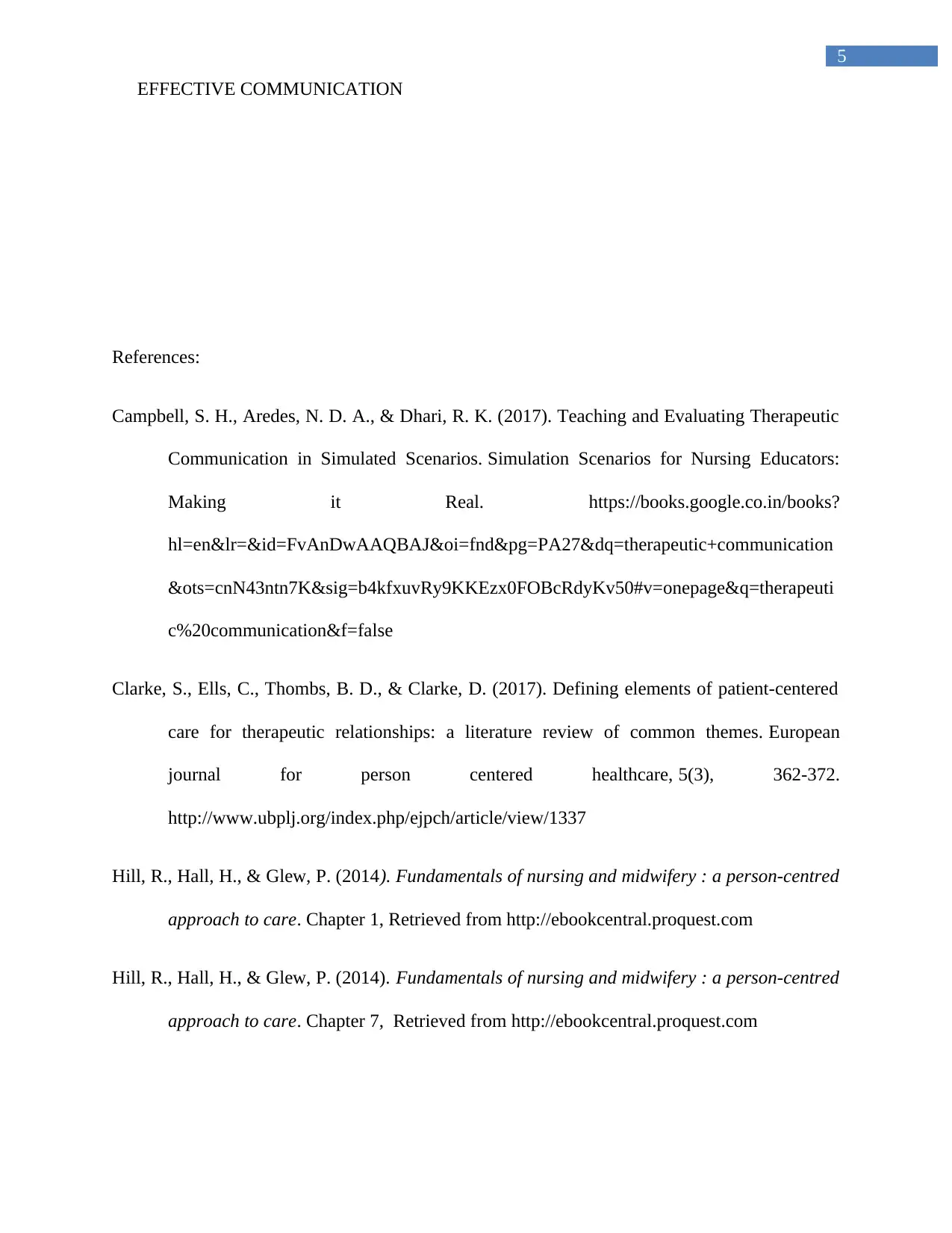
5
EFFECTIVE COMMUNICATION
References:
Campbell, S. H., Aredes, N. D. A., & Dhari, R. K. (2017). Teaching and Evaluating Therapeutic
Communication in Simulated Scenarios. Simulation Scenarios for Nursing Educators:
Making it Real. https://books.google.co.in/books?
hl=en&lr=&id=FvAnDwAAQBAJ&oi=fnd&pg=PA27&dq=therapeutic+communication
&ots=cnN43ntn7K&sig=b4kfxuvRy9KKEzx0FOBcRdyKv50#v=onepage&q=therapeuti
c%20communication&f=false
Clarke, S., Ells, C., Thombs, B. D., & Clarke, D. (2017). Defining elements of patient-centered
care for therapeutic relationships: a literature review of common themes. European
journal for person centered healthcare, 5(3), 362-372.
http://www.ubplj.org/index.php/ejpch/article/view/1337
Hill, R., Hall, H., & Glew, P. (2014). Fundamentals of nursing and midwifery : a person-centred
approach to care. Chapter 1, Retrieved from http://ebookcentral.proquest.com
Hill, R., Hall, H., & Glew, P. (2014). Fundamentals of nursing and midwifery : a person-centred
approach to care. Chapter 7, Retrieved from http://ebookcentral.proquest.com
EFFECTIVE COMMUNICATION
References:
Campbell, S. H., Aredes, N. D. A., & Dhari, R. K. (2017). Teaching and Evaluating Therapeutic
Communication in Simulated Scenarios. Simulation Scenarios for Nursing Educators:
Making it Real. https://books.google.co.in/books?
hl=en&lr=&id=FvAnDwAAQBAJ&oi=fnd&pg=PA27&dq=therapeutic+communication
&ots=cnN43ntn7K&sig=b4kfxuvRy9KKEzx0FOBcRdyKv50#v=onepage&q=therapeuti
c%20communication&f=false
Clarke, S., Ells, C., Thombs, B. D., & Clarke, D. (2017). Defining elements of patient-centered
care for therapeutic relationships: a literature review of common themes. European
journal for person centered healthcare, 5(3), 362-372.
http://www.ubplj.org/index.php/ejpch/article/view/1337
Hill, R., Hall, H., & Glew, P. (2014). Fundamentals of nursing and midwifery : a person-centred
approach to care. Chapter 1, Retrieved from http://ebookcentral.proquest.com
Hill, R., Hall, H., & Glew, P. (2014). Fundamentals of nursing and midwifery : a person-centred
approach to care. Chapter 7, Retrieved from http://ebookcentral.proquest.com
⊘ This is a preview!⊘
Do you want full access?
Subscribe today to unlock all pages.

Trusted by 1+ million students worldwide
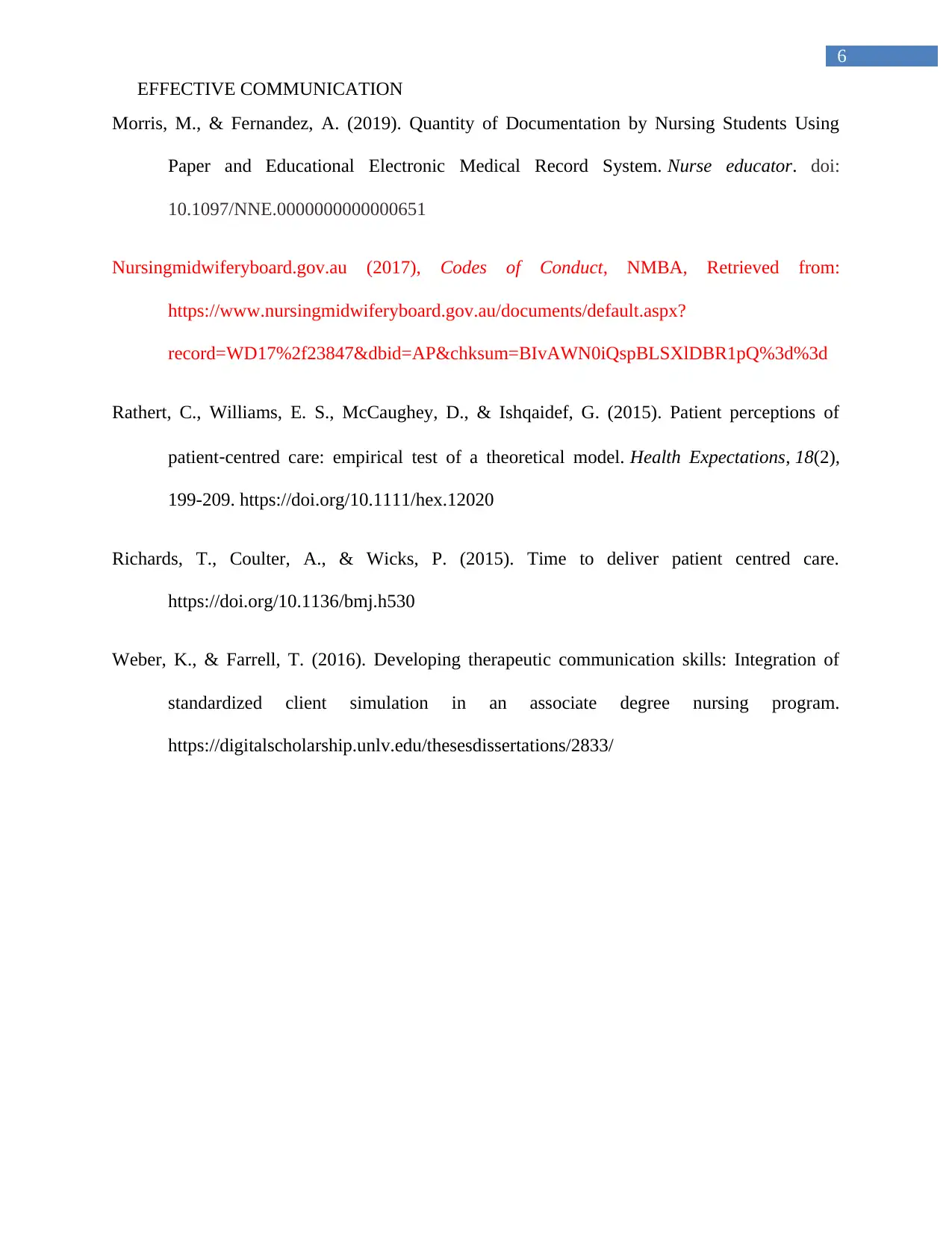
6
EFFECTIVE COMMUNICATION
Morris, M., & Fernandez, A. (2019). Quantity of Documentation by Nursing Students Using
Paper and Educational Electronic Medical Record System. Nurse educator. doi:
10.1097/NNE.0000000000000651
Nursingmidwiferyboard.gov.au (2017), Codes of Conduct, NMBA, Retrieved from:
https://www.nursingmidwiferyboard.gov.au/documents/default.aspx?
record=WD17%2f23847&dbid=AP&chksum=BIvAWN0iQspBLSXlDBR1pQ%3d%3d
Rathert, C., Williams, E. S., McCaughey, D., & Ishqaidef, G. (2015). Patient perceptions of
patient‐centred care: empirical test of a theoretical model. Health Expectations, 18(2),
199-209. https://doi.org/10.1111/hex.12020
Richards, T., Coulter, A., & Wicks, P. (2015). Time to deliver patient centred care.
https://doi.org/10.1136/bmj.h530
Weber, K., & Farrell, T. (2016). Developing therapeutic communication skills: Integration of
standardized client simulation in an associate degree nursing program.
https://digitalscholarship.unlv.edu/thesesdissertations/2833/
EFFECTIVE COMMUNICATION
Morris, M., & Fernandez, A. (2019). Quantity of Documentation by Nursing Students Using
Paper and Educational Electronic Medical Record System. Nurse educator. doi:
10.1097/NNE.0000000000000651
Nursingmidwiferyboard.gov.au (2017), Codes of Conduct, NMBA, Retrieved from:
https://www.nursingmidwiferyboard.gov.au/documents/default.aspx?
record=WD17%2f23847&dbid=AP&chksum=BIvAWN0iQspBLSXlDBR1pQ%3d%3d
Rathert, C., Williams, E. S., McCaughey, D., & Ishqaidef, G. (2015). Patient perceptions of
patient‐centred care: empirical test of a theoretical model. Health Expectations, 18(2),
199-209. https://doi.org/10.1111/hex.12020
Richards, T., Coulter, A., & Wicks, P. (2015). Time to deliver patient centred care.
https://doi.org/10.1136/bmj.h530
Weber, K., & Farrell, T. (2016). Developing therapeutic communication skills: Integration of
standardized client simulation in an associate degree nursing program.
https://digitalscholarship.unlv.edu/thesesdissertations/2833/
1 out of 7
Related Documents
Your All-in-One AI-Powered Toolkit for Academic Success.
+13062052269
info@desklib.com
Available 24*7 on WhatsApp / Email
![[object Object]](/_next/static/media/star-bottom.7253800d.svg)
Unlock your academic potential
Copyright © 2020–2026 A2Z Services. All Rights Reserved. Developed and managed by ZUCOL.





